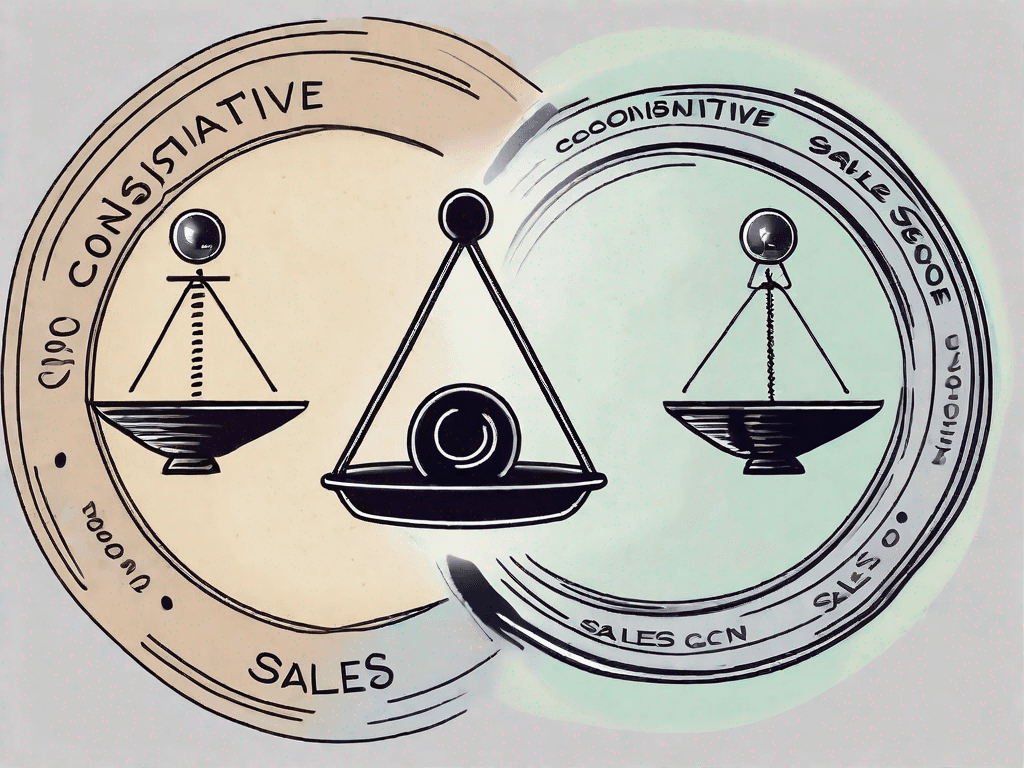
Sales Operations Manager vs Sales Director: What's the Difference?
In the world of sales, there are various roles and titles that can sometimes be confusing. Two such roles that often get mixed up are the Sales Operations Manager and the Sales Director. While both play crucial roles in driving sales success, they have distinct responsibilities and areas of focus. In this article, we will delve into the differences between a Sales Operations Manager and a Sales Director, providing clarity on their roles and showcasing specific examples to highlight these differences.
Defining Sales Operations Manager and Sales Director
1.1 - What is a Sales Operations Manager?
A Sales Operations Manager is a key player in sales organizations. They primarily focus on optimizing sales processes and improving overall sales performance. This role involves an analytical and strategic mindset, as Sales Operations Managers need to identify inefficiencies, implement process improvements, and support the sales team in achieving their targets.
One of the core responsibilities of a Sales Operations Manager is to analyze sales data and provide insights to the sales team and management. They leverage various tools and technology to track sales metrics, such as revenue, conversion rates, and customer acquisition costs. Furthermore, they are responsible for managing the sales forecasting process and ensuring accurate and timely sales forecasts.
In addition to their analytical duties, Sales Operations Managers also play a crucial role in sales planning and territory management. They collaborate with the sales team to develop sales strategies and set achievable targets. By analyzing market trends and customer behavior, Sales Operations Managers help identify new opportunities for growth and expansion.
Moreover, Sales Operations Managers are often involved in sales training and enablement. They work closely with the sales team to provide training on sales processes, tools, and techniques. By equipping the sales team with the necessary skills and knowledge, Sales Operations Managers contribute to the overall success of the sales organization.
1.2 - What is a Sales Director?
A Sales Director, on the other hand, is a senior-level executive responsible for managing and leading the sales team. They are primarily focused on developing and executing sales strategies to drive revenue growth and achieve business objectives. Sales Directors oversee the entire sales process, from lead generation to deal closure.
Sales Directors are responsible for building and maintaining relationships with key clients and strategic partners. They work closely with other departments, such as marketing and product development, to align sales efforts with overall business goals. Additionally, Sales Directors play a pivotal role in coaching and developing the sales team, providing guidance and support to ensure their success.
In addition to their leadership role, Sales Directors are often involved in strategic decision-making. They analyze market trends, competitor activities, and customer feedback to identify new business opportunities and develop effective sales strategies. By staying abreast of industry developments, Sales Directors can position their sales team for success and stay ahead of the competition.
Furthermore, Sales Directors are responsible for setting sales targets and monitoring performance. They establish key performance indicators (KPIs) and track the progress of the sales team against these targets. By regularly reviewing sales performance, Sales Directors can identify areas for improvement and take necessary actions to drive sales growth.
Lastly, Sales Directors often represent the sales department in senior management meetings and contribute to overall business strategy. They provide valuable insights and recommendations based on their deep understanding of the market and customer needs. By aligning sales objectives with the broader business goals, Sales Directors play a crucial role in driving organizational success.
What's the difference between a Sales Operations Manager and a Sales Director?
While both roles are critical for sales success, the key differences lie in their focus and scope of responsibilities. The Sales Operations Manager focuses on optimizing processes and analyzing data, while the Sales Director takes a broader view and focuses on strategic planning and team leadership.
Let's dive deeper into the roles and responsibilities of each position to gain a better understanding of their unique contributions to a sales organization.
A Sales Operations Manager plays a crucial role in ensuring the efficiency and effectiveness of the sales process. They are responsible for analyzing sales data, identifying trends, and providing insights to drive strategic decision-making. By closely monitoring key performance indicators (KPIs), they can identify areas for improvement and implement process enhancements to streamline operations. Their expertise lies in leveraging technology and data analytics to optimize sales processes, improve forecasting accuracy, and enhance overall sales performance.
On the other hand, a Sales Director takes a more holistic approach to sales management. They are responsible for setting strategic goals, developing sales strategies, and overseeing the execution of these strategies to achieve revenue targets. Sales Directors are often involved in high-level decision-making, collaborating with other departments to align sales initiatives with overall business objectives. They provide leadership and guidance to the sales team, ensuring that they have the necessary resources and support to meet their targets. Building and nurturing relationships with key clients and stakeholders is also a critical aspect of a Sales Director's role, as they play a pivotal role in driving business growth and securing long-term partnerships.
While a Sales Operations Manager works behind the scenes, analyzing data and implementing process improvements, a Sales Director is involved in more front-facing activities, such as building relationships with clients and leading the sales team. This difference in focus highlights the complementary nature of these roles within a sales organization. While the Sales Operations Manager ensures the smooth functioning of sales processes, the Sales Director provides strategic direction and leadership to drive revenue growth.
Furthermore, the skill sets required for these roles also differ. Sales Operations Managers tend to have a more analytical and technical skill set, as they need to be proficient in data analysis tools, CRM systems, and sales automation software. They possess a deep understanding of sales processes and are adept at identifying bottlenecks and implementing solutions. On the other hand, Sales Directors require strong leadership and communication skills. They must be able to inspire and motivate their team, effectively communicate the organization's vision, and build strong relationships with clients and stakeholders.
In conclusion, while both Sales Operations Managers and Sales Directors play vital roles in driving sales success, their responsibilities and areas of focus differ significantly. The Sales Operations Manager optimizes processes and analyzes data, while the Sales Director takes a broader view, focusing on strategic planning and team leadership. By working together, these two roles contribute to the overall growth and success of a sales organization.
Examples of the Difference between a Sales Operations Manager and a Sales Director
2.1 - Example in a Startup Context
In a startup context, a Sales Operations Manager would be responsible for designing and implementing a streamlined sales process, leveraging automation tools to optimize efficiency. On the other hand, a Sales Director would focus on developing and executing sales strategies to acquire new customers and drive revenue growth, acting as the face of the company in meetings with potential investors and partners.
2.2 - Example in a Consulting Context
In a consulting context, a Sales Operations Manager would analyze sales data to identify trends and areas of improvement, proposing changes to the sales team based on their findings. A Sales Director, on the other hand, would be responsible for building relationships with key clients and overseeing the entire sales process to maintain client satisfaction and achieve revenue targets.
2.3 - Example in a Digital Marketing Agency Context
For a digital marketing agency, a Sales Operations Manager would analyze performance metrics to optimize marketing campaigns and improve lead generation processes. Meanwhile, a Sales Director would focus on building partnerships with other agencies and developing sales strategies to win new clients, ultimately driving business growth.
2.4 - Example with Analogies
To better understand the differences between these roles, we can draw analogies. If we compare a sales organization to a well-oiled machine, the Sales Operations Manager would be the engineer, fine-tuning the various components to achieve maximum efficiency. On the other hand, the Sales Director would be the conductor, orchestrating the entire sales team to perform in harmony and achieve outstanding results.
Conclusion
In conclusion, while both roles are crucial for sales success, a Sales Operations Manager and a Sales Director have distinct responsibilities and areas of focus. The Sales Operations Manager optimizes sales processes and analyzes data, while the Sales Director develops strategies and leads the sales team. By understanding these differences and how they apply in different contexts, organizations can ensure they have the right individuals in place to drive sales growth and achieve their business objectives.


















































































































































